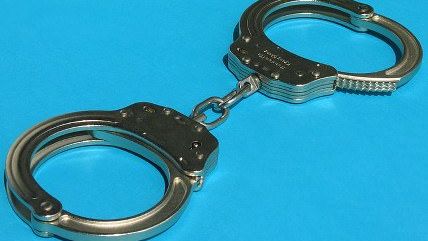Woman Charged With 'Wiretapping' For Recording Her Own Arrest (But Federal Law May Protect Her)


Massachusetts law enforcement officials are shy creatures; they deeply resent being recorded, even when going about taxpayers' business in public places. The latest person to feel their wrath is Karen Dziewit, of Chicopee, Massachusetts. She faces wiretapping charges for using her smartphone to record police officer who were busting her for disorderly conduct and possessing an open container of alcohol. That's a popular application of the law in the state by cops who like operating unmonitored, but a recent federal appeals court decision suggests that she was well within her rights.
According to MassLive:
According to city police, Dziewit was arrested while drinking on Chestnut Street early Sunday morning. Prior to being taken into custody, police said, she activated an audio recording app on her smartphone. Police discovered the phone, with the recording feature still engaged, during the booking process, which triggered the unlawful wiretap charge.
Massachusetts law prohibits the recording of audio without the consent of the person being recorded.
Massachusetts is a "two party consent" state both regarding electronic communications and in-person conversations. The statute criminalizes anybody who "willfully commits an interception, attempts to commit an interception, or procures any other person to commit an interception or to attempt to commit an interception of any wire or oral communication."
Cops in the state have been enthusiastic about using the law to record their activites without their say-so. Needless to say, if you ask for permission, the likely answer is "no."
Activist Peter Lowney was convicted in 2007 of "wiretapping" a Boston University police sergeant with a hidden video camera during a political protest. And libertarian police accountability activists Adam Mueller and Pete Eyre were similarly charged for recording at a Franklin County jail, though a jury later acquitted them of all charges.
A jury may not be the only hope for Dziewit. In 2011, the federal First Circuit Court of Appeals ruled in favor of activist Simon Glik, who recorded an arrest on Boston Common.
[I]s there a constitutionally protected right to videotape police carrying out their duties in public? Basic First Amendment principles, along with caselaw from this and other circuits, answer that question unambiguously in the affirmative.
Jeffe Hermes of the Digital Media Law Project understandably proclaimed that decision "a victory for recording in public."
The court language seems unambiguous, but Glik was openly recording; Dziewit didn't announce her intentions or brandish the phone (which would not have been a recommended move, anyway). That may be just enough of a difference for the Hampden County District Attorney to hang his transparency-hating hat on.
But that federal appeals court decision really seems to suggest that recording the cops in public is a right, and the wiretapping law doesn't shield them from scrutiny when they're going about their duties.
Editor's Note: As of February 29, 2024, commenting privileges on reason.com posts are limited to Reason Plus subscribers. Past commenters are grandfathered in for a temporary period. Subscribe here to preserve your ability to comment. Your Reason Plus subscription also gives you an ad-free version of reason.com, along with full access to the digital edition and archives of Reason magazine. We request that comments be civil and on-topic. We do not moderate or assume any responsibility for comments, which are owned by the readers who post them. Comments do not represent the views of reason.com or Reason Foundation. We reserve the right to delete any comment and ban commenters for any reason at any time. Comments may only be edited within 5 minutes of posting. Report abuses.
Please to post comments


The court language seems unambiguous, but Glik was openly recording; Dziewit didn't announce her intentions or brandish the phone (which would not have been a recommended move, anyway).
Uh, yeah, 'brandishing' a phone to a police officer is nigh guaranteeing you're going to go home in a body bag.
That's a popular application of the law in the state by cops who like operating unmonitored, but a recent federal appeals court decision suggests that she was well within her rights.
Rights? You think the King's Men give two hoots about the 'rights' of peasants?
She deered to record a King's dare.
Strucken has Kared again!
For those that don't live in Mass, be glad you didn't have to listen to the utter stupidity flowing from the radio this morning. I think some people around here would have fully supported lynching that woman.
I'm mulling it over...what is the argument against recording police officers again?
They're our brave heroes out there on the streets doing God's work. Also, recording people is illegal. It doesn't matter why, it's illegal. Illegal is bad and deserves to be punished as hard as can be.
"recording people is illegal..."
And cops are *people*. Peasants, on the other hand, have no rights that they can enforce against *people*.
So none of the stores have security cameras? Or do you have to sign a consent form to stop in a convenience store to buy a candy bar and a soda?
You're giving too much credit to people who never bother to think that far. It's illegal, period. There is nothing else past that.
"recording people is illegal..."
Except when cops do it, or some other part of the government.
I can see why the good people of Massoftwoshits, would side with these fine officers. After all, it was people like them who saved the entire city of Boston from the Marathon Bombers, by dragging people out of their homes to search their property without warrants.
Come on Frank, it's Massivetwoshits. Get it right!
Also, strangely enough the whole Boston thing it what is driving some people to have second thoughts about the police. It's becoming a pretty stark dividing line where you're either fully on one side or the other with no fence sitters.
I lack the knowledge of the statutes involved, but it seems to me that recording a conversation between two private parties is a rather different animal when compared to recording an arrest made in public by officers acting in an official capacity. They are not private parties in the latter case. They're public agents.
" statute criminalizes anybody who "
Anybody?
Statute criminalizes any *peasant* who...
Rules don't apply to our rulers, you silly goose.
"but Glik was openly recording; Dziewit didn't announce her intentions or brandish the phone"
And if she had, I'm sure the courteous officers wouldn't have beaten her unconscious after taking and smashing her phone. No, they would have thanked her for providing evidence that they were totally law abiding public servants.
So when do you Mass residents all sign your blanket consent to be recorded by the government? I mean, that seems like it would be an outgrowth of this law, right?
Eliminate qualified immunity for any L.E.O., local state, or federal (who makes an arrest based on being filmed/recorded)... problem solved. It's 'settled law'...
[I]s there a constitutionally protected right to videotape police carrying out their duties in public? Basic First Amendment principles, along with caselaw from this and other circuits, answer that question unambiguously in the affirmative.
Of course, the officers' basic Fourth Amendment rights trump that crap.
Totally reasonable expectation of privacy just like totality of circumstances; or as Clint Eastwood put it "[be]cause of this gun, this badge and the love of Jesus in my pretty green eyes".
Of course, the officers' basic Fourth Amendment rights trump that crap.
Um... How exactly did she unreasonably search or seize the officer's person, houses, papers, or effects?
I wonder what happened to the recording after the cops discovered it.
If they erased it they couldn't prove her crime.
Stupid punk loser cops. This is why I REJOICE everytims some stupid cop gets clipped in the line of duty.
http://www.Anon-VPN.com
Wow AnnonBot is straight Stainless Steel Gangsta.
There nay be an out.
"The term "interception" means to secretly hear, secretly record, or aid another to secretly hear or secretly record the contents of any wire or oral communication through the use of any intercepting device by any person other than a person given prior authority by all parties to such communication..."
"The term "intercepting device" means any device or apparatus which is capable of transmitting, receiving, amplifying, or recording a wire or oral communication other than a hearing aid or similar device which is being used to correct subnormal hearing to normal and other than any TELEPHONE or telegraph instrument, equipment, facility, or a component thereof, (a) furnished to a subscriber or user by a communications common carrier in the ordinary course of its business under its tariff and being used by the subscriber or user in the ordinary course of its business; or (b) being used by a communications common carrier in the ordinary course of its business."
Since telephones are exempt from the definition of "intercepting device" she may not be guilty of an "interception". It would depend on how a court interprets part (a) though. Part (a) shows how out of date the law is since phone companies haven't provided phones in decades.
Soooo... I'm not allowed to record my interaction during my own arrest so I may use it in my own defense at trial? Got that.
Fuckin' Massachusetts
You can't do it SECRETLY.
What cop is going to ALLOW you to record them during an arrest if they know they are full of shit in their arrest? Mass requires "two-party consent".
That's a separate issue. You don't need consent to record OPENLY.
Ok, so you record openly, the cop tells you to turn off the camera, and if you refuse, you get tazed and your camera confiscated. Win-win I tell ya
Yes, but you won't be charged with wiretapping.